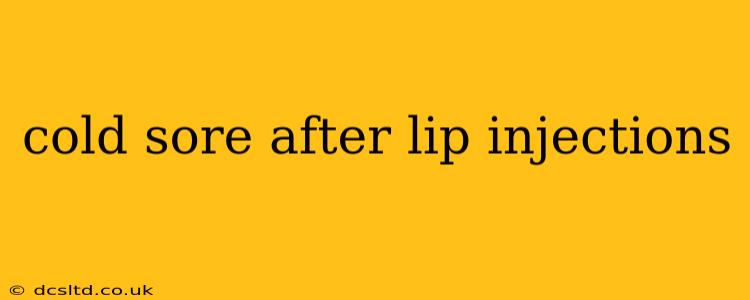Lip injections are a popular cosmetic procedure to enhance lip fullness and shape. However, one potential side effect that can occur after lip injections is a cold sore outbreak. This is a common concern for many, and understanding the causes, prevention methods, and treatment options is crucial. This comprehensive guide will address all your questions about cold sores after lip injections.
Why Do I Get Cold Sores After Lip Injections?
The primary reason for cold sore outbreaks after lip injections is the reactivation of the herpes simplex virus (HSV), specifically HSV-1, which is responsible for most oral herpes infections. While the injection itself doesn't cause the cold sore, the procedure can trigger a reactivation of the dormant virus. This happens because the injection process can cause minor trauma to the lip tissue, which can disrupt the immune system's ability to keep the virus suppressed. Stress from the procedure, itself, can also play a role. Many people carry the HSV-1 virus without ever experiencing symptoms, but certain triggers can reactivate it.
Can Lip Injections Cause Cold Sores?
Lip injections themselves do not directly cause cold sores. They can, however, trigger an outbreak in individuals who already carry the herpes simplex virus. The minor trauma associated with needle injections can provide the necessary stimulus for the dormant virus to become active.
How Long After Lip Injections Can a Cold Sore Appear?
A cold sore can appear anywhere from a few days to a couple of weeks after lip injections. The timeline varies depending on the individual's immune system and the severity of the viral reactivation. Some might experience symptoms immediately, while others might not see an outbreak until later.
How Can I Prevent Cold Sores After Lip Injections?
Prevention is key when it comes to minimizing the risk of cold sores after lip injections. Here are several preventative measures you can take:
-
Antiviral Medication: Discuss with your injector the possibility of starting a preventative course of antiviral medication (like acyclovir or valacyclovir) before your procedure. This can significantly reduce the risk of an outbreak.
-
Pre-Procedure Assessment: Ensure your injector thoroughly assesses your medical history, including any history of cold sores or herpes infections. This helps them manage the risk appropriately.
-
Hygiene: Maintain excellent oral hygiene both before and after your lip injections. This involves regular brushing and flossing to keep your mouth clean and reduce the chance of infection.
-
Stress Reduction: Stress can trigger cold sores. Practice stress-reducing techniques like yoga, meditation, or deep breathing exercises before and after your procedure.
-
Sun Protection: Sun exposure can also trigger cold sores. Use a lip balm with SPF protection to shield your lips from the sun's harmful rays.
What Should I Do If I Get a Cold Sore After Lip Injections?
If you develop a cold sore after lip injections, don't panic. While unsightly, they are usually self-limiting. Here's what you should do:
-
Contact Your Injector: Inform your injector immediately. They can provide advice and potentially prescribe antiviral medication to help speed up healing and reduce the severity of the outbreak.
-
Over-the-Counter Treatments: Use over-the-counter cold sore creams or ointments containing ingredients like docosanol. These can help alleviate symptoms like pain, itching, and burning.
-
Avoid Touching the Sore: This helps prevent the spread of the virus to other areas of your face or body.
-
Avoid Sharing Personal Items: Don't share utensils, lip balms, or anything that might come into contact with the cold sore.
Will a Cold Sore Affect the Results of My Lip Injections?
Usually, a cold sore will not affect the long-term results of your lip injections. Once the cold sore heals, the underlying lip filler remains unaffected. However, it's crucial to allow the cold sore to heal completely before applying any makeup or other products to the area.
Conclusion
While cold sores after lip injections are a possibility, they are often preventable and manageable. Open communication with your injector, proactive preventative measures, and prompt treatment can minimize the risk and discomfort associated with this side effect. Remember that seeking professional medical advice is always recommended if you have concerns about cold sores or any other side effects from cosmetic procedures.
